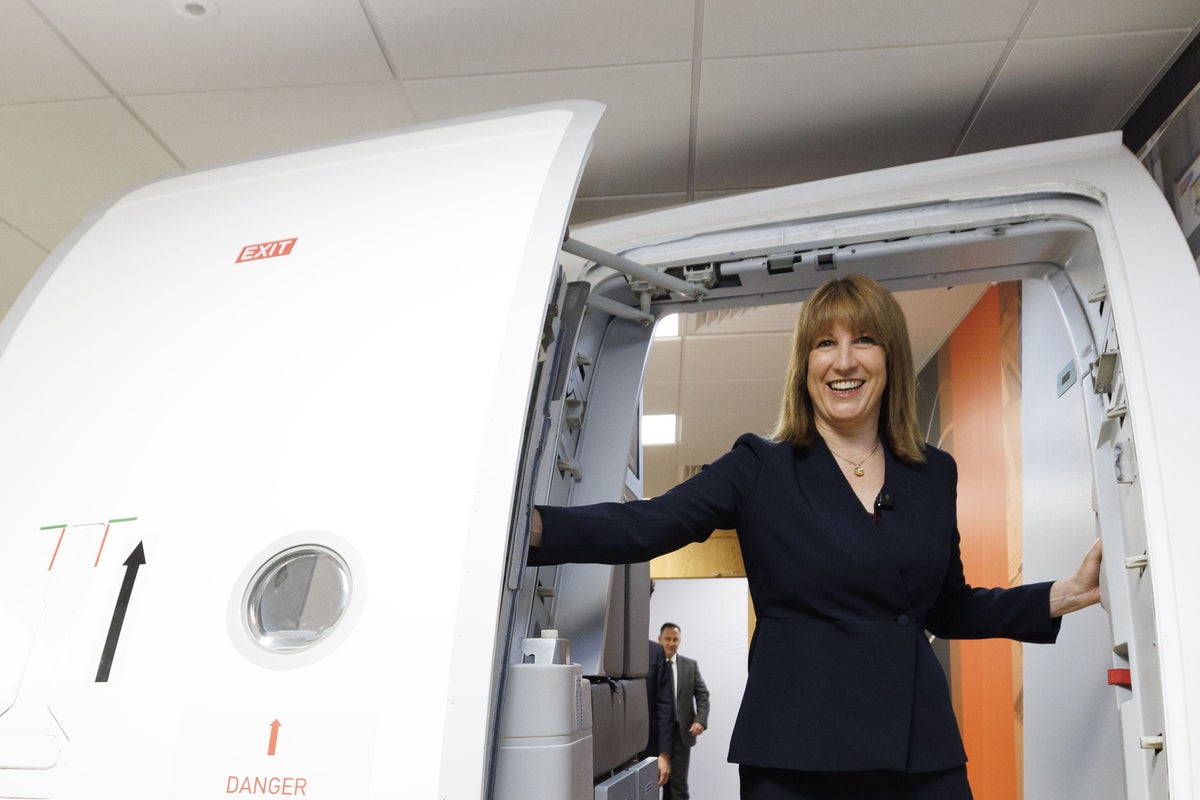Business
Reeves: Gatwick second runway shows Government ‘backing builders, not blockers’

Gatwick Airport’s £2.2 billion second runway plan could create thousands of jobs and help “kickstart the economy”, Chancellor Rachel Reeves said.
In the privately financed project, the West Sussex airport will move its emergency runway 12 metres north, enabling it to be used for departures of narrow-bodied planes such as Airbus A320s and Boeing 737s.
This will enable it to be used for about 100,000 more flights a year.
Ms Reeves said: “This Government promised to kickstart the economy – and we are.
“A second runway at Gatwick means thousands of more jobs and billions more in investment for the economy.”
The Chancellor views the plan as a signal of the Government’s commitment to back “the builders, not the blockers”.
She said: “By slashing red tape and transforming the planning system to get Britain building again we are investing in this country’s renewal and building an economy that works for working people.”
Ms Reeves is keen to seize on any positive news for the economy as she prepares for her November 26 Budget against a backdrop of sluggish growth and inflation remaining stubbornly above target.
The Gatwick scheme has been given the go-ahead by Transport Secretary Heidi Alexander.
She backed the scheme as a “no-brainer” for economic growth, a Government source said, suggesting flights could take off from the new full runway before 2029.
The Cabinet minister is satisfied with adjustments made, covering issues such as noise mitigation and the proportion of passengers who would travel to and from the airport by public transport.
It comes after the Planning Inspectorate initially rejected the airport’s application and earlier this year recommended Ms Alexander should approve the project if the changes were made.
New commitments include a legally binding target for the proportion of passengers who travel to Gatwick by public transport, rather than the airport’s management setting its own targets.
Residents affected by more noise will be able to ask Gatwick to cover the costs for triple-glazed windows.
Homeowners, living directly beneath the new flight routes who choose to sell could have their stamp duty and reasonable moving costs paid, as well as estate agent fees of up to 1% of the purchase price.
Gatwick says its plans will create £1 billion per year in economic benefits, and generate an additional 14,000 jobs.
A Government source told the PA news agency: “With capacity constraints holding back business, trade and tourism, this is a no-brainer for growth.
“This Government has taken unprecedented steps to get this done, navigating a needlessly complex planning system, which our reforms will simplify in future.
“It is possible that planes could be taking off from a new full runway at Gatwick before the next general election.”
The source said the expansion must be delivered in line with climate change commitments and meet strict environmental requirements.
Local campaigners opposed to expansion are concerned about the impact on surface transport, noise, housing provision and wastewater treatment, but the airport insists it has conducted “full and thorough assessments” of those issues.
Cagne, an umbrella aviation community and environment group for Sussex, Surrey and Kent, said it stands ready to serve a judicial review funded by residents and environmental bodies.
The group said: “We know this Government cares little for the environmental impact aviation is having on our planet and Gatwick’s neighbours, but not to demand that Gatwick pays for the infrastructure, the onsite wastewater treatment plant, and noise impact is unlawful in our book.”
The Labour Government’s backing of a third runway at Heathrow Airport in its bid to grow the economy has also drawn criticism from environmental groups and opposition politicians.
The move was welcomed by shadow transport secretary Richard Holden, who accused Labour of delaying the “key” decision.
He said: “This decision should have been made months ago. Labour pledged to go ‘further and faster’ on growth, yet they’ve dithered and delayed at every turn.
“Pushing key decisions down the road has only created uncertainty for businesses and local communities.”
But Green Party leader Zack Polanski said: “Labour keeps wheeling out the same nonsense about growth, but at what cost? What this really means is more pollution, more noise for local communities, and no real economic benefit.”
Stewart Wingate, Vinci Airports managing director for the UK and former Gatwick chief executive, said: “After a lengthy and rigorous planning process, we welcome the Government’s approval of plans to bring our Northern Runway into routine use, ahead of the expected deadline.
“This is another important gateway in the planning process for this £2.2bn investment, which is fully funded by our shareholders and will unlock significant growth, tourism and trade benefits for London Gatwick and the UK and create thousands of jobs.
“As we’ve said previously, it is essential that any planning conditions enable us to realise the full benefits of the project and do not impose unnecessary constraints that make it uneconomic to invest in.
“We now need to carefully examine the details of the planning consent. Once we have done that, we will be able to comment further.”
Business
SEBI Proposes Overhaul Of Gold And Silver ETF Price Bands After Sharp Swings

Last Updated:
SEBI proposes stricter base price and band rules for gold, silver ETFs, including cooling-off periods after sharp global price swings to curb volatility.


Amid Global Commodity Volatility, SEBI Plans New Price Band Rules for Gold, Silver ETFs
The market regulator has sought to curb extreme volatility in gold and silver Exchange Traded Funds (ETFs) by proposing changes to the base price and price band framework. Currently, there are no separate price bands for ETFs aligned with their underlying assets, making them vulnerable to sharp price movements.
The proposal comes after sharp volatility in gold and silver ETFs triggered by fluctuations in global commodity prices. On some days, these ETFs fell by over 15%, while on others, they recorded sharp gains.
Stock exchanges currently apply a fixed price band of plus or minus 20% on the base price of ETFs, except for Overnight ETFs investing only in TREPs, which have a price band of plus or minus 5%.
Moreover, the base price for applying price bands to ETFs is taken as the T-2 day closing Net Asset Value (NAV) by exchanges, instead of the T-1 day closing NAV or price, as is the case with indices and individual stocks. This creates a challenge, as the closing NAV of ETFs typically differs between T-1 and T-2 days. Corporate actions such as bonuses and dividends are adjusted manually, increasing the risk of errors.
What Are the Key Proposals?
SEBI has proposed that the base price be determined using either the closing price of the ETF on T-1 day (weighted average price of the last 30 minutes), the closing NAV of T-1 day, or the average indicative NAV (iNAV) of the last 30 minutes of T-1 day.
Further, the regulator has proposed an initial price band of plus or minus 10% for equity and debt ETFs, which can be flexed up to plus or minus 20%. A cooling-off period of 15 minutes will apply, and up to two flexes will be allowed in a day.
For gold and silver ETFs, the regulator has proposed an initial price band of plus or minus 6%, which can be flexed up to plus or minus 20%. This will also include a 15-minute cooling-off period.
February 14, 2026, 16:08 IST
Read More
Business
Petrol and diesel prices likely to rise – SUCH TV

Oil and Gas Regulatory Authority (OGRA) forwarded a summary to the federal government suggesting an increase of Rs4.39 per liter in petrol price for the next fortnight.
After approval from the federal government, one liter of petrol will be sold at Rs257.56 instead of Rs253.17 per liter.
The price of high-speed diesel (HSD) will be increased by Rs5.40 per liter.
After approval, the price of one liter of high-speed diesel will increase by Rs268.38 to Rs273.78.
The proposal to increase the price of kerosene by Rs4 per liter is also on the cards.
The OGRA also recommended increasing the price of one liter of light diesel by Rs6.55.
The new prices of petroleum products will be effective from February 16, 2026.
Due to tension between the USA and Iran, petroleum prices are likely to increase further.
Business
Rising vet costs leave Birmingham charity with £400k bill

The group, based in Solihull and Wolverhampton, says its vet bills are costing them more.
Source link
-

 Entertainment1 week ago
Entertainment1 week agoHow a factory error in China created a viral “crying horse” Lunar New Year trend
-

 Tech1 week ago
Tech1 week agoNew York Is the Latest State to Consider a Data Center Pause
-

 Business4 days ago
Business4 days agoAye Finance IPO Day 2: GMP Remains Zero; Apply Or Not? Check Price, GMP, Financials, Recommendations
-

 Tech1 week ago
Tech1 week agoNordProtect Makes ID Theft Protection a Little Easier—if You Trust That It Works
-

 Tech1 week ago
Tech1 week agoPrivate LTE/5G networks reached 6,500 deployments in 2025 | Computer Weekly
-

 Fashion4 days ago
Fashion4 days agoComment: Tariffs, capacity and timing reshape sourcing decisions
-

 Business1 week ago
Business1 week agoStock market today: Here are the top gainers and losers on NSE, BSE on February 6 – check list – The Times of India
-

 Business1 week ago
Business1 week agoMandelson’s lobbying firm cuts all ties with disgraced peer amid Epstein fallout





